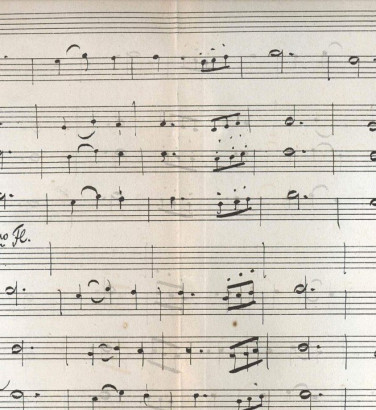
Musical jokes, from satire to April Fools
29 Mar 2024
News Story
Sea Creature No. 2 (1958), from Hoffnung's Musical Chairs. Drawing by Gerard Hoffnung reproduced by kind permission of The Gerard Hoffnung Partnership, London. © The Gerard Hoffnung Partnership
Newcomers to classical music can sometimes be taken aback to find that it’s a world with a surprising sense of humour, and not always in those quarters you’d expect.
In terms of performances designed to provoke laughter, there can be no higher point than the Music Festivals masterminded by the humorist Gerard Hoffnung in the late 1950s. Among the many highlights of these performances, one of the most memorable was surely Reizenstein’s Concerto Popolare. Subtitled ‘A piano concerto to end all piano concertos’, this sees the musical conflict between soloist and orchestra taking on an unexpected new dimension. Tim Minchin’s introduction in the video below (from the 2011 BBC Proms) does give the first joke away, but listen out for other favourite concertos entering the fray as the disagreement escalates …
The 1950s saw the rise of another much-loved musical satirist, the soprano Anna Russell. Among her many sketches mocking various musical styles and their performers, the true standout is a peerless takedown of Wagner’s Ring Cycle: yes, she highlights the plot’s absurdities – moments after identifying Gutrune as the first woman Siegfried has ever met who hasn’t been his aunt, she famously insists “I’m not making this up, you know!” – but her take on this 20-hour epic is beloved by Wagnerites for accurately distilling it into a mere 20 minutes.
It has to be said Wagner has proven an especially popular target of satire, probably in part due to the relative lack of humour in his music. Less biting than Anna Russell, but also considerably less respectful was the French pianist Clément Doucet (who had been taught by Wagner’s father-in-law, one Franz Liszt), who played his own ragtime arrangements of music including Tannhäuser and Tristan and Isolde at Le bœuf sur le toît, the Parisian jazz club of the interwar period. The two styles may make for unlikely bedfellows, but (as with his versions of Chopin waltzes) somehow the combination works – so well, in fact, that to a modern ear, Doucet seems to anticipate Looney Tunes’ irreverent approach to the classics.
Also in the 1920s, The Flying Dutchman was subjected to barbed satire by Hindemith – another composer not generally known for his sense of humour – whose reworking of its overture is subtitled ‘as sight-read by a bad spa orchestra at 7am by the well’ (i.e. in bad light). In addition to mistiming several entries, this hapless ensemble plays no end of wrong notes and appears not to have the best sense of rhythm, all of this being carefully notated in the score. This actually makes the piece quite a challenge to perform: making Wagner sound so wonderfully wrong clearly takes some effort!
The best-known work to mock its players’ incompetence is probably Mozart’s Musical joke, which features some wince-inducing horn playing and a violin cadenza which almost ends in the wrong key. Over and above this, however, Mozart also takes subpar composers to task, with uninspired ideas and no end of decidedly clunky scoring. Familiarity with the work may have lessened its effectiveness, but there’s still a lot of enjoyment to be had from the surprise of some concert-goers who suddenly realise they know the music from (of all places) the BBC’s Horse of the Year Show.
This institution is of course no stranger to April Fools, including a claim in 1961 that the evening concert was to feature “the distinguished continental pianist Lirpa Loof”, a name that takes a lot less unravelling when seen written down. In recent years, there has been a steady growth of other musical institutions joining in the fun. In 2014, King’s College, Cambridge, claimed the increasing difficulty of recruiting new trebles had forced their choir to reassess how to perform works such as Allegri’s Miserere. We won’t spoil the punchline, but let the video below speak for itself.
Rest assured, however, that the SCO wouldn’t stoop to such nonsense. Or would we?
Related Stories
![]()
Unfinished symphonies
15 December 2025
Your starter for ten: besides Schubert, who has an unfinished symphony to their name?![]()
Andrew Manze: "I've always loved Viennese waltzes and polkas"
1 December 2025
Our Principal Guest Conductor is really looking forward to conducting our Viennese New Year concerts!![]()
The medieval carol
24 November 2025
For this year's Christmas article, we look back at some very early festive carols ...


